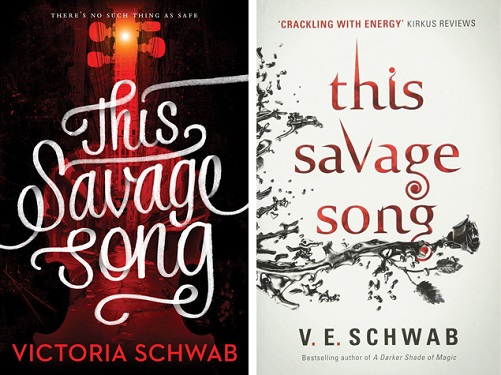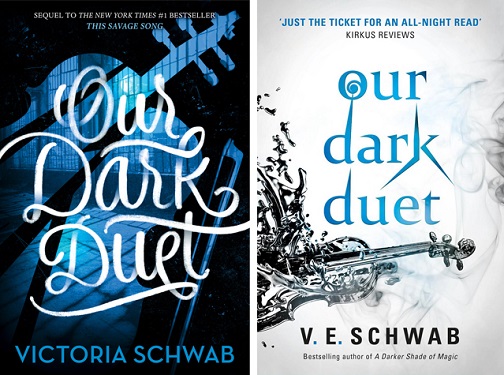Victoria Schwab’s Monsters of Verity duology is my new everything. The story hooks you from word one and never lets go, not that you’d want it to anyway. The characters are fire and ice; they bite and fight and delight all at once. The series is dark and tragic yet hopeful and honest. Schwab never pulls her punches, condescends, or sugarcoats. She knows what teenagers are capable of and what her teenage readers can handle, and she brings both right to the very edge of comfort. Not to mention the inclusive diversity.
In the city of Verity, monsters lurk in the shadows. For years the metropolis has been severed in two: North City, a prosperous dictatorship whose denizens pay Callum Harker for the privilege of his protection, and South City, a struggling democracy overseen by Henry Flynn and his counsel of advisors. Tensions have always been high between the two enclaves, but their tenuous cease fire is about to collapse.
In This Savage Song, Harker’s prodigal daughter, Kate, returns to Verity determined to make her father accept her. Her ruthless ambition and cold heart are tempered by the newest boy at the elite high school Colton Academy, August Flynn. Unbeknownst to everyone in North City, August is a Sunai sent to spy on the Harkers. Soon the two teens find themselves pulled into conspiracy after conspiracy, betrayal after betrayal, and the only way they’ll get out alive is by working together.
In the second entry of the duology, Our Dark Duet, Kate returns to Verity from yet another sojourn, this time in search of a new monster that emigrated from the distant city of Prosperity. This Chaos Eater spreads like a virus, infecting humans and pushing them to commit horrific killings. One of the wicked Malchais from the first book returns as well, now with a sinister new companion. They wreak havoc on North City, their bloodlust putting Flynn’s floundering attempt at unifying V-City in jeopardy. August, meanwhile, has come to accept his role as monstrous enforcer, but Kate’s arrival forces him to rethink everything. Once again, only August and Kate can save the day, but this time it’s not their kindness but their sin that will do the trick.
 While the literal world that Schwab builds here is thinly sketched—in a tantalizing rather than incomplete way—her magical system is rich and detailed. Here, monsters are made from humanity’s violence against itself. Corsai are kind of like zombies. They feed on human flesh and think, in the loosest possible definition of that word, in a hivemind. Vampire-esque Malchai feed on human blood and are shades or mirrors of the human who created them. Monsters and humans alike fear Sunai. Born from horrific acts of mass violence, Sunai use music to take the souls of humans who have killed; August in particular plays a violin. Where Harker has the Corsai and Malchai doing his dirty work, Flynn has the Sunai to hold the wall.
While the literal world that Schwab builds here is thinly sketched—in a tantalizing rather than incomplete way—her magical system is rich and detailed. Here, monsters are made from humanity’s violence against itself. Corsai are kind of like zombies. They feed on human flesh and think, in the loosest possible definition of that word, in a hivemind. Vampire-esque Malchai feed on human blood and are shades or mirrors of the human who created them. Monsters and humans alike fear Sunai. Born from horrific acts of mass violence, Sunai use music to take the souls of humans who have killed; August in particular plays a violin. Where Harker has the Corsai and Malchai doing his dirty work, Flynn has the Sunai to hold the wall.
Built on the bones of that magic is a powerful story about understanding, empathy, and acceptance. August and Kate want to be better versions of themselves, and want to be deemed worthy by the people they admire. I think everyone at some point goes through a period where they feel left out and alone and believe that life would be better if only they were different. But marginalized kids in majority communities and those with deadbeat parents will especially connect with August and Kate.
For me, Kate’s journey cut the deepest. I grew up desperate for attention from a father who had no interest in me whatsoever. The need for his acceptance eventually became unbearable, and I acted out in increasingly risky ways. It wasn’t until my early twenties when he and I finally talked that I learned what Kate did about her own father: he wasn’t worth the heartache. Shedding that emotional dead weight allowed me to finally become my own person, but like Kate I first had to go through the loss and rejection of the man who helped create me. I haven’t really thought about my father much over the intervening years, but Kate brought back the memory of all those terrible emotions. Now, however, I have time and maturity on my side and the pain isn’t as sharp or lingering. Seeing Kate experience her own catharsis was, in turn, cathartic for me.
But it’s not just the heady emotions leaving readers devastated. Schwab is an incredible writer with a good eye for lyrical text. This Savage Song plays with a musical motif, while Our Dark Duet turns to poetry as its muse. I relished the way Schwab told the story of August and Kate. Depending on her mood her words can be a knife, a grenade, a calming tea, or Pandora’s box.
Friends.
The word glanced off her ribs, hard enough to leave her winded.
Because she knew a secret: there were two kinds of monsters, the kind that hunted the streets and the kind that lived in your head. She could fight the first, but the second was more dangerous. It was always, always, always a step ahead.
It didn’t have teeth or claws, didn’t feed on flesh or blood or hearts.
It simply reminded you of what happened when you let people in.
 The plot races along, but she never leaves the reader behind. While everyone not August and Kate could use some more shading or exploration of their motivation, at least they aren’t reduced to plot devices. To be honest, the only thing I didn’t care for was the late stage romance in Our Dark Duet. I won’t spoil who hooks up with whom, but needless to say the (to me) wholly unnecessary affair left a sour taste in my mouth. Just once I’d like to read YA where no one falls in love. Is that too much to ask?
The plot races along, but she never leaves the reader behind. While everyone not August and Kate could use some more shading or exploration of their motivation, at least they aren’t reduced to plot devices. To be honest, the only thing I didn’t care for was the late stage romance in Our Dark Duet. I won’t spoil who hooks up with whom, but needless to say the (to me) wholly unnecessary affair left a sour taste in my mouth. Just once I’d like to read YA where no one falls in love. Is that too much to ask?
Before I go I want to take a moment to talk about Soro. We meet Soro in the sequel as a new Sunai born from the chaos of the first book. Soro is also genderqueer and uses they/them pronouns. Thing is, none of the other characters taunt or terrorize them about their identity, and their identity has nothing to do with the plot. All too often, diverse characters end up being tokenized, have to defend their diversity, or their diversity ends up a plot point. Not to mention “diversity” being treated like a list of boxes to check off rather than part of a character’s heritage and history. Especially when the character presents an identity less common or less familiar to the general public. Schwab treats Soro with the same respect as the rest of her characters. Soro isn’t Schwab’s first character to disregard the gender binary—see Lila Bard in the Shades of Magic series—and Schwab is respectful of how her non-binary/genderfluid/agender readers might identify with Soro.
Schwab’s Monsters of Verity shares the same DNA as Robin McKinley’s devastatingly brilliant Sunshine. Both tales center on a damaged young women who are stronger than they know and their monster-turned-ally who aren’t as monstrous as humans think they are. Both are set in worlds shattered by vaguely defined cataclysms that brought monsters to the surface. And both end abruptly and leave you panting for more. If you love Sunshine, This Savage Song and Our Dark Duet should be next on your To Read queue. Hell, if you love a good monster story with compelling characters and an exciting plot you’ll dig the Monsters of Verity series.
The Monsters of Verity duology—This Savage Song and Our Dark Duet—is available in the US from Greenwillow Books, and in the UK from Titan Books.
Alex Brown is a teen librarian, writer, geeknerdloserweirdo, and all-around pop culture obsessive who watches entirely too much TV. Keep up with her every move on Twitter and Instagram, or get lost in the rabbit warren of ships and fandoms on her Tumblr.










